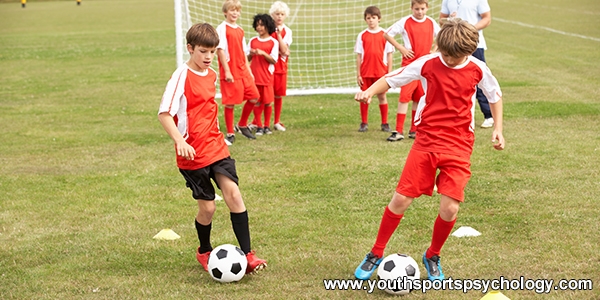Using Mindset to Get to The Next Level
Some young atheltes define themselves by their limitations, saying “I’m shorter than most basketball players,” “I’m not as fast as other players on the soccer field,” or “I don’t have enough speed on my fastball to play college baseball.”
When young athletes focus on limitations or weaknesses, they undermine their practice and performance. Size, ability and strength are valuable attributes but are not the game-changing factors that make athletes elite.
For example, undersized NFL wide receivers have been inducted into the Hall of Fame. Many tennis players have great careers even though they don’t have overpowering strokes. Athletes have made names for themselves by out-hustling other competitors.
Work is what differentiates elite athletes from others.
That’s not just about working hard in practice. It’s also about preparation–which includes diet, flexibility and strength training. And just as important, it’s about mental work, which involves confidence building, boosting focus and managing stress.
When athletes invest in the mental work, they learn technical skills faster and are better able to replicate those skills under the pressure of competition. They maximize their abilities and reach more of their potential. They perform more consistently and at a higher level.
Investing in the mental side of sports also helps kids meet the demands of competing at high levels. But too often, athletes, coaches and parents neglect the mental side of sports, even though mental skills contribute most to optimal performance.
Adding mental skill training can boost young atheletes’ performance to new levels and help them achieve their potential.
Canadian basketball player Natalie Achonwa is motivated to help Canada win its first ever Olympic medal. Achonwa will be competing in her third Olympic Games and is doing everything she can to prepare and help Canada reach the podium at the 2021 Tokyo Olympics.
In spite of the adversity brought about by the pandemic, Canada has found methods to build team unity and prepare in every way possible.
“We did a virtual training camp where we spent about two hours a day on a Zoom call doing everything from team building to mental training with our sports psych, to tactical stuff, watching film, breaking down film. It was a tactical week via Zoom,” said Achonwa.
The Canada Olympic basketball team is putting in the work, fully preparing mentally, tactically and physically. Team Canada is taking advantage of every opportunity, in spite of obstacles.
Young atheltes could accomplish much more if they, too, committed more to mental training. The challenge is finding the time and helping busy athletes buy into the importance.
To work on the mental game, kids, with their coaches, should create a seasonal plan for their mental training. Young athletes need to think about which mental skills will benefit them most. How will they develop these skills? Where will they participate in mental training? Which resources will they utilize to improve their mental game?
Once the physical training is complete and it’s time to compete, athletes’ mental work pays off.
Even if kids aren’t playing sports right now due to COVID-19, they can work on their mental skills. This will take them to a new level of performance.
Related Articles on Kids’ Mental Game:
- The Link Between Sports Kids’ Mental Game and Mental Health
- How Sports Kids’ Mental Game Affects College Recruitment
- This Pro’s Mental Game Helped Her Overcome Physical Limitations
*Subscribe to The Sports Psychology Podcast on iTunes
*Subscribe to The Sports Psychology Podcast on Spotify
Improve Your Mental Game From Anywhere In The World

We’re certain that, as a parent, you want to help your child develop confidence and discipline in sports and life. And as a sports parent, you’d love for your children to reach their potential in sports. But encouraging your child to strive for greatness without pressuring them can be a challenge.
You can get expert mental coaching with us from anywhere. Meet with us via Zoom, Skype, FaceTime or phone call. With today’s video technology, we are able to connect with athletes and coaches all over the globe.
Call Us Today to Schedule Your Free 15-Minute Session.
Find Out How Your Athlete Can Benefit From One-on-One Mental Coaching!

